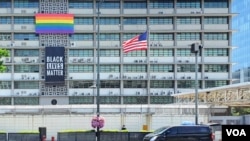Senior U.S. military and diplomatic officials in South Korea are taking a public stand in support of the racial justice movement in the United States.
Late last week, the U.S. Embassy in Seoul hung a giant Black Lives Matter banner on its main building, directly beneath a previously placed rainbow flag in support of LGBTQ rights.
On Monday, the U.S. military in South Korea, which had already held a series of Black Lives Matter community events, went a step further, banning displays of the Confederate battle flag on its bases.
It is the latest example of U.S. government, military and other institutions expressing self-reflection and solidarity with the wave of global protests against racism and police violence.
“Our #BlackLivesMatter banner shows our support for the fight against racial injustice and police brutality as we strive to be a more inclusive & just society,” read a tweet from the embassy.
The U.S. Embassy stands in solidarity with fellow Americans grieving and peacefully protesting to demand positive change. Our #BlackLivesMatter banner shows our support for the fight against racial injustice and police brutality as we strive to be a more inclusive & just society. pic.twitter.com/Y4Thr2MRdw
— U.S. Embassy Seoul (@USEmbassySeoul) June 13, 2020
U.S. diplomats and military officials often try to project U.S. values at their overseas postings, but those tasks have been complicated by repeated police killings of African Americans.
General Robert Abrams, the top U.S. commander in South Korea, tweeted he was outraged at the police killings and the “racism and bigotry that continues.”
“To be clear—there is NO place for it in our country and NO place for it in our military. ZERO,” Abrams said.
“Sadly, the recent events have only exposed what has been bubbling above and below surface as long as I have been alive. It exists in our country. It exists in our military,” he added.
1/7
— Robert Abrams (@DogFaceSoldier) June 5, 2020
We should all be outraged and ashamed at the killing of George Floyd & others by police. I know I am.
We should be equally outraged against racism and bigotry that continues. To be clear—there is NO place for it in our country and NO place for it in our military. ZERO.
The U.S. Navy and Marine Corps have already moved to prohibit displays of the Confederate flag, which was carried during the U.S. Civil War by southern forces that wanted to preserve slavery.
The U.S. Army has also said it was open to renaming nearly a dozen bases named after leaders of the Confederacy, which surrendered to Union forces in 1865. But the move to rename bases was criticized by President Donald Trump, who has long opposed the destruction of Confederate displays.
“These Monumental and very Powerful Bases have become part of a Great American Heritage, and a history of Winning, Victory, and Freedom,” Trump tweeted last week. “Therefore, my Administration will not even consider the renaming of these Magnificent and Fabled Military Installations.”
...history of Winning, Victory, and Freedom. The United States of America trained and deployed our HEROES on these Hallowed Grounds, and won two World Wars. Therefore, my Administration will not even consider the renaming of these Magnificent and Fabled Military Installations...
— Donald J. Trump (@realDonaldTrump) June 10, 2020
Although many of the U.S. protesters have been critical of Trump, the movement is largely focused on police violence, as well as the practices and allegations of racial bias in U.S. institutions.
Polls have revealed widespread support for the protests, underscoring a major shift in U.S. public opinion since the previous rounds of Black Lives Matter demonstrations.
"Something seems different this time,” says Daniel Pinkston, who teaches international relations in Seoul.
Major U.S. institutions such as the military and diplomatic corps, which have diverse, multicultural workforces, now face significant pressure to confront racism, says Pinkston, a former Air Force linguist.
Not dealing with those problems, especially in the military, “undermines productivity, effectiveness and morale,” he adds.
For U.S. diplomats, who often criticize the rights abuses of foreign autocrats, part of the concern may also be about consistency in messaging - especially as international headlines condemn the heavy-handed U.S. police response to the protests.
“I've never seen the U.S. reputation take this kind of hit in such a short time,” says Pinkston.
But so far, the embassy in Seoul appears to be the only U.S. diplomatic outpost to prominently display a Black Lives Matter sign.
“USA is a free & diverse nation...from that diversity we gain our strength,” tweeted U.S. Ambassador Harry Harris, a retired U.S. Navy admiral.
I believe in what President JFK said on June 10, 1963 at American University: "If we cannot now end our differences, at least we can help make the world safe for diversity." USA is a free & diverse nation...from that diversity we gain our strength. https://t.co/vpk2NbFoWl
— Harry Harris (@USAmbROK) June 13, 2020
Harris, a Trump appointee, is planning to resign at the end of the year, according to a recent Reuters report which the U.S. embassy did not confirm.
Past stances
It’s not the first time the embassy in Seoul has taken a stance on social issues.
The embassy has for years flown a rainbow flag in solidarity with human rights and civil society organizations that push for LGBTQ rights in South Korea. Many U.S. embassies around the world fly such flags, especially during June, which is LGBTQ Pride Month.
But the Trump administration last year demanded embassies submit a formal request to fly the flag on their flagpoles, according to NBC News. Many of those requests were denied, it said; instead, the embassies were told they could only fly the flags in other places, such as the side of their building or indoors.
Neither Trump nor other White House officials have commented on the latest displays.




